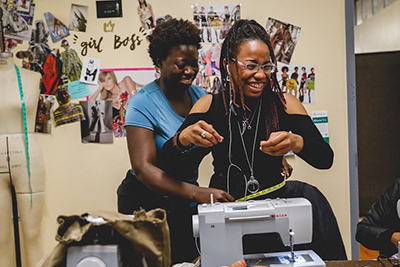
The 7th Annual Capital Impact Partners Co-op Innovation Award—which aims to increase co-op development in communities with low incomes and/or communities of color—focused on supporting organizations that are expanding education about the cooperative model in the face of the twin pandemics of COVID and racial injustice.
In partnership with The National Cooperative Bank, the 2021 awardees are Cooperation Humboldt ($20,000), Custom Collaborative ($25,000), Collective Remake ($25,000), Co-op Dayton ($25,000) and Co-op Cincy ($35,000). The awardees received a total of $130,000.
“Our Co-op Innovation Award has been going strong for seven years, supporting emerging co-op developers to build community prosperity in underestimated communities across the country,” said Ellis Carr, president and CEO of Capital Impact Partners and CDC Small Business Finance. “In the face of increasing pronounced inequity, co-ops provide a clear path to sovereignty and wealth building that foster equity. Our partnership with the National Cooperative Bank and others continues to be a powerful tool to achieve this goal,” Carr added.
“National Cooperative Bank is proud to once again work with Capital Impact Partners to award these deserving organizations with the Co-op Innovation Award,” said Charles Snyder, CEO of NCB. “Each organization is deeply rooted in their community and will enhance the cooperative model to address income inequality and increase community ownership. We look forward to seeing the impact of their work in the years to come.”
In addition, this year the award pool was expanded through the participation of additional sponsors Cabot Creamery, CUNA Mutual Group and Local Government Federal Credit Union, helping augment the award opportunities by $30,000.
This year’s Co-op Innovation Award focused on utilizing the co-op model to develop new programs or strategies to address the impact of the economic crisis. Priority was given to food, worker and housing cooperatives, but all sectors were invited to apply.
Of the applications submitted, many focused on expanding diversity, equity and inclusion in their offerings, providing culturally appropriate cooperative opportunities for communities of color, women-owned businesses, Indigenous communities, people living with criminal records and the LGBTQIA+ community.
Co-op Cincy
Co-op Cincy is being awarded $35,000 to launch “Power In Numbers: Black Co-op U,” which will infuse their three-month co-op development course with racial justice education and co-op history.
Created in response to the racially exacerbated effects of the health and economic crisis, Co-op Cincy will pilot this new BIPOC-focused co-op development course with three Black-led cohorts, providing ongoing technical assistance and mini startup grants. This will enable 6-8 Black co-op entrepreneur teams to launch their worker-owned businesses successfully and provide feedback to create a “train-the-trainer” course, enabling co-op developers around the country to conduct their own Power In Numbers: Black Co-op U trainings in their cities.
“At a time when the coronavirus is wreaking havoc on the health and wealth of African Americans in Cincinnati, Co-op Cincy is using grant funding to lift historically underserved communities out of poverty,” said Ellen Vera, Director of Development and Co-op Organizing at Co-op Cincy. “African Americans disproportionately occupy essential jobs, which often pay low wages and offer no or meager health benefits. We are filled with gratitude for the positive impact that this grant funding will have on helping Co-op Cincy create an economy that works for all.”
Co-op Dayton
Co-op Dayton is being awarded $25,000 to support Unified Power, a real estate investment co-op that organizes the residents of West Dayton to own and control land and development in their neighborhoods; create quality, affordable rental and homeownership opportunities; and revitalize disinvested commercial and residential streets.
With the participation of 150 people, primarily Black residents of West Dayton, Co-op Dayton collectively designed a model that incorporates two complementary affordable housing strategies—the real estate investment cooperative and community land trusts. This model of pairing community investment with a long-term approach to affordability responds directly to the twin problems of blight and high housing costs. It is meant to counterbalance the ups and downs of the local real estate market by ensuring that the benefits of investment stay with the residents most impacted by disinvestment.
“The grant dollars provided by Capital Impact Partners will help Unified Power to galvanize a community that has been isolated and divided by racial and economic oppression and now the public health crisis of the coronavirus pandemic,” said Kenya Baker, Executive Director of Unified Power Cooperative. “Through Unified Power’s community land trust and real estate investment cooperative structure, the community will amplify our voice, our collective impact, and our access to quality affordable housing.”
Collective REMAKE
Collective REMAKE in Los Angeles is being awarded $25,000 to support the creation of worker-owned businesses and other kinds of cooperatives for people who have been incarcerated and/or excluded from the mainstream economy.
The Co-op Innovation Award will fund several of Collective REMAKE’s programs that were created during the economic and health crisis: a Train the Trainers Program that will engage trainers with lived experience to facilitate participatory workshops; a Co-op Development Program to support startup cooperatives; and a Wellness Hub that will focus on barriers to reentry and mental health services.
“Collective REMAKE is committed to building an eco-system—using participatory practices—that includes a network of cooperative economic development, inclusive support systems and sustainable healing communities,” said Mary Sutton, Design and Management at Collective REMAKE. “This award will support Collective REMAKE’s efforts to develop a network of cooperatives with communities impacted by incarceration in South Los Angeles.”
Custom Collaborative
Custom Collaborative in New York City is being awarded $25,000 to empower Black and Brown, low-income and immigrant women who have been excluded from business and the sustainability movement with the tools and platform to lead in the creation of new solutions for the fashion industry and our planet.
Their aim is to ensure that the women whose labor constitutes the working capital of the fashion industry are afforded the dignity of their work and a proportional share in the wealth they create. In 2020, Custom Collaborative launched Fashion That Works Production (FTWP), a worker cooperative whose member owners are graduates of their Training Institute. The Co-op Innovation Award will support FTWP as a sustainable business that centers marginalized women as learners and leaders and will be used as a pilot for the fashion industry. The grant will also build the capacity of their visual education platform, which will include on-demand and live interactive lessons.
“In response to the COVID-19 pandemic, Custom Collaborative makers produced over 10,000 masks to sell to families and workers, as well as donating masks to neighbors and community members, generating income to support themselves in the midst of the shutdown,” said Ngozi Okaro, Executive Director of Custom Collaborative. “This award will support the development and growth of more worker cooperatives, which are central to achieving our goal of creating ethical, innovative, profitable businesses that provide equitable opportunities to earn income and retain wealth and control for our communities.”
Cooperation Humboldt
Cooperation Humboldt on California’s North Coast is being awarded $20,000 to run a no-cost, six-week, bi-lingual, project-based educational program for aspiring entrepreneurs.
Participants in the program receive ongoing technical assistance from a team of cooperative business advisors. With the Co-op Innovation Award funds, Cooperation Humboldt will launch its Cooperative Business Equity Program. The program was developed collaboratively with community colleges, local Indigenous tribes, immigrant communities and Community Development Financial Institutions (CDFIs). It will train cooperative business advisors BIPOC communities living with low incomes, including the Wiyok and Yurok tribes. In addition, the program will include supportive services like childcare subsidies, remedial education, trauma-informed support, remote community access, and direct capital infusion that will mitigate barriers to worker ownership.
“For rural BIPOC and extremely low-income incumbent and displaced workers, racial, cultural and language discrimination, intergenerational trauma, substandard education, severe economic depression, disproportionate effects of the COVID-19 pandemic, and a lack of capital limit access to the support systems necessary for entrepreneurial pursuits,” said Tobin McKee, Program Administrator of Cooperation Humboldt. “The pressures of low job-quality, unemployment, childcare costs, trauma recovery and family responsibilities often make it impossible for people living in poverty and hardship to set aside the time and money for business training and development. The Cooperative Business Equity Program’s unique approach is to mitigate barriers to entry by training and employing cooperative business advisors from underserved communities, and providing individualized and culturally appropriate supportive services for their clients,” McKee added.
Since Capital Impact Partners started the Co-op Innovation Award in 2015, more than $515,000 in grants have been given to 17 organizations to innovative cooperative organizations nationwide. Those funds have been leveraged for more than $6.3 million to start emerging and support existing co-ops.
During times of crisis, the cooperative model encourages greater civic engagement, as well as community self-determination, agency and growth. Worker cooperatives, in particular, have been increasing through innovative organizing and growth strategies that empower workers and build wealth for those who are locked out the mainstream economy. As mission-driven organizations focus more on expanding economic, social and racial justice across the country, cooperatives and organizations that empower them will continue to be partners in broadening opportunities for all.


